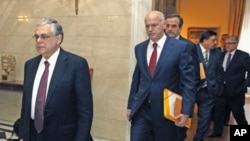Greek lawmakers say they have reached an accord on austerity measures demanded by international lenders so the country can secure another bailout and avoid defaulting next month on its financial obligations.
After an all-night negotiating session that ended early Thursday, Greek political leaders remained deadlocked on the extent of pension cuts for retirees, while agreeing to trim the country's minimum wage by 22 percent and eliminate 15,000 government jobs.
Hours later, however, Prime Minister Lucas Papademos and his coalition partners announced they had found an unspecified, alternative way to pare government spending, marking a key turning point after weeks of negotiations with Greece's creditors.
Related video by Mil Arcega:
Greek Finance Minister Evangelos Venizelos headed to a Brussels meeting with other European finance ministers to plead the debt-ridden country's case to win their approval for a new $172 billion bailout, the country's second in two years. Greece says it needs the aid package from the European Union, the European Central Bank and the International Monetary Fund in order to avoid defaulting on $19 billion in bond payments due in March.
EU Economic Commissioner Olli Rehn said Greece will have to convince the finance chiefs it is serious about economic reform.
"We have a staff level agreement now and I am sure the ministers will thoroughly scrutinize this agreement and it's up to the Greek government by concrete actions through legislation, and other actions to convince its European partners that the second program can be made to work," he said.
The Athens government is also completing negotiations with private lenders to cut in half the amount it owes them, a $132 billion reduction. Under the revised financing of the country's debt, 32 large financial institutions would lose 70 percent of their Greek investment.
European leaders have grown impatient with Greece's protracted negotiations over its debt, with financial analysts voicing fears that a default could plunge the global economy into a new recession. Meanwhile, Greek leaders have faced widespread opposition at home from workers angered by earlier austerity measures. Unions called for more work stoppages on Friday and Saturday to protest the latest budget-cutting plan.
Even with the agreement on more austerity, Greece remains in a precarious financial state. It is in the fifth year of a recession. The government says the country's unemployment rate is increasing and nearly reached 21 percent in November.
Meanwhile, the continent's central bank kept its benchmark lending rate at the record low rate of 1 percent, in an effort to spur economic growth. The bank has kept the rate low as the 17-nation bloc that uses the euro currency faces a stalled economy and is possibly headed to a recession.
Bank chief Mario Draghi says Europe's economy remains threatened.
"Based on our regular economic and monetary analysis we decided to keep the key ECB interest rates unchanged. the information that has become available since January, broadly confirms our previous assessment. Inflation is likely to stay above 2 percent for several months to come before declining to below 2 percent. Available survey indicators confirms some tentative signs of stabilization in economic activity at low level around the turn of the year. The economic outlook remains subject to high uncertainty and downside risks," said Draghi.
Draghi rejected the idea that the central bank assume losses on the Greek debt it holds. But he said the bank could return some of its profits on the Greek bonds to the countries supporting the institution.
Some information for this report was provided by AP and AFP.




